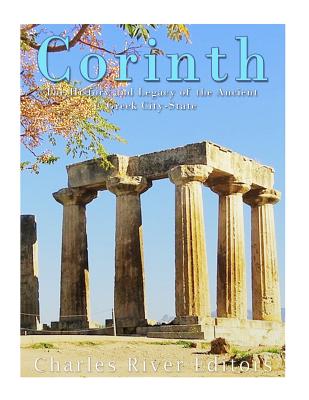Corinth: The History and Legacy of the Ancient Greek City-State

Corinth: The History and Legacy of the Ancient Greek City-State
*Includes pictures
*Includes ancient accounts of Corinth
*Includes online resources and a bibliography for further reading
Modern perceptions of Classical Greece are almost invariably based on Athens and Sparta, but Corinth was also a key city-state in antiquity. When St. Paul visited in 51 CE, the Corinth he saw was actually a relatively new city, having been built a little over 100 years previously, but he found a city five times larger than Athens at that time and one which was the capital of a prosperous province. However, ancient Corinth had actually been founded in the 10th century BCE and was, for most of its history, the richest port and the largest city in all of Greece. Corinth had a population in excess of 90,000 in 400 BCE, but the Romans leveled this original city in 146 BCE, killing all the male inhabitants and selling the women and children into slavery. The few that survived fled to Delos, and for the next 100 years the site was deserted until Julius Caesar rebuilt it in 44 BCE.
The story of the rise and fall of this powerful polis is intriguing, as are the reasons for ancient Corinth's reputation throughout the Greek world for its licentiousness. One of the Greek words for fornication was korinthiazomai, and while the city's association with sacred prostitutes scandalized contemporary Athenians in particular, it also made the city a favorite destination for many Greeks. Corinth was also where so much of what became recognized as "Greek art and architecture" was first developed, and it was here that Eastern influence on Greece can first and most obviously be detected.
The destruction of ancient Corinth marked the end of free Greece, but despite the integral role it played in Hellas, Corinth has never been recognized as a great military or naval power in the way that Athens and Sparta have. It did not boast any exceptional schools of philosophy, nor are there any great buildings still remaining to attest to its successes. Corinth's contribution to the spread of Greek civilization, however, matches if not surpasses all of the more well-known poleis.
Corinth also acted as a gateway for many of the artistic ideas from the East that local artisans adapted and developed to produce their own uniquely Corinthian style of pottery and art. In architecture, too, Corinth's contribution was significant, and the Corinthian style was utilized throughout Greece and the Greek world, especially in relation to temple building
Descrierea produsului
*Includes pictures
*Includes ancient accounts of Corinth
*Includes online resources and a bibliography for further reading
Modern perceptions of Classical Greece are almost invariably based on Athens and Sparta, but Corinth was also a key city-state in antiquity. When St. Paul visited in 51 CE, the Corinth he saw was actually a relatively new city, having been built a little over 100 years previously, but he found a city five times larger than Athens at that time and one which was the capital of a prosperous province. However, ancient Corinth had actually been founded in the 10th century BCE and was, for most of its history, the richest port and the largest city in all of Greece. Corinth had a population in excess of 90,000 in 400 BCE, but the Romans leveled this original city in 146 BCE, killing all the male inhabitants and selling the women and children into slavery. The few that survived fled to Delos, and for the next 100 years the site was deserted until Julius Caesar rebuilt it in 44 BCE.
The story of the rise and fall of this powerful polis is intriguing, as are the reasons for ancient Corinth's reputation throughout the Greek world for its licentiousness. One of the Greek words for fornication was korinthiazomai, and while the city's association with sacred prostitutes scandalized contemporary Athenians in particular, it also made the city a favorite destination for many Greeks. Corinth was also where so much of what became recognized as "Greek art and architecture" was first developed, and it was here that Eastern influence on Greece can first and most obviously be detected.
The destruction of ancient Corinth marked the end of free Greece, but despite the integral role it played in Hellas, Corinth has never been recognized as a great military or naval power in the way that Athens and Sparta have. It did not boast any exceptional schools of philosophy, nor are there any great buildings still remaining to attest to its successes. Corinth's contribution to the spread of Greek civilization, however, matches if not surpasses all of the more well-known poleis.
Corinth also acted as a gateway for many of the artistic ideas from the East that local artisans adapted and developed to produce their own uniquely Corinthian style of pottery and art. In architecture, too, Corinth's contribution was significant, and the Corinthian style was utilized throughout Greece and the Greek world, especially in relation to temple building
Detaliile produsului












